#cattle of helios
Text
Helios @ his cows: I just think they’re neat
#homer humor#the odyssey#Helios#cows#sacred cow#cattle of the sun#homer’s odyssey#greek mythology#titan
41 notes
·
View notes
Text
Every time I get into a new fandom that really Compels Me I get this feeling of shame, like “noooo I can’t Do Fandom about this, I need to respectfully appreciate the art and write clever and critical meta, if I do silly fandom stuff that’s so EMBARRASSING”
but it feels especially silly that I’m feeling this over Greek Mythology of all things
#Feeling the Embarrassment™ over writing a ‘what if Polites survived the ship being smited for eating the cattle of Helios and he got back#to Ithaca independently. Faster than Odysseus did btw. And he was fine. And they had a touching reunion when Odysseus got back and Realized#because like. Points to the Odyssey. You can’t PROVE it didn’t happen
11 notes
·
View notes
Text
one must sometimes spare a thought for circe. not the circe found in madeline miller's novel, but the one homer spoke about.
born to a powerful titan in the age of the olympians, a sister to thousands of siblings. yet never important enough to guard helios' cattle, never pretty enough to be married off to a human king of crete. never smart enough to stand beside her father. simply circe. young, unspecial, forgotten circe.
of how she saw kinship form for her siblings, and how strongly they loved. her mother forgotten by her father, simply another nymph, or the man she loved so dearly but who never glanced at her.
the rage that must have filled her veins when glaucus dared to appear before her and beg for a potion to trick a woman into loving him. how she loved him so purely, but was rejected and used. the regret that came when scylla no longer looked like herself, and how even then glaucus did not want her.
never good enough. replacable. easily cast out by her father, banished to an island where she will mother neither sons nor daughters, and constantly be forced to raise the daughters of gods who wanted sons.
will they become her daughters one day? will she go above and beyond to protect them as her own mother did not protect her?
what did she think, i wonder, when her niece appeared before her grasping a sword bearing the blood of her nephew? what could have possibly gone through her head when she saw the insincere look hidden within jason's eyes? i wonder if the gods told her how he scorned medea eventually, the same way glaucus did her.
and then he appears and he is everything she has ever wanted. but day and night he speaks of his wife, even as he lays in the warmth of her arms, in her silken sheets, hidden behind her wooden door held up by the walls of her home.
he sails away and that is that. another chapter. another empty nothingness.
one must spare a thought for the goddess waiting alone on the shores of a forgotten island amidst daughters she did not mother waiting for a destiny she will never find.
#tagamemnon#greek mythology#the odyssey#circe madeline miller#epic the circe saga#epic the musical#homer#the iliad#argonautica#jason and the argonauts#medea#i think about her a lot#how every man in her life spurned her#circe#you are everything to me circe
118 notes
·
View notes
Note
Hello! Do you have any interesting facts about the goddess Hera?
anon you’re my hero for asking this question 🙏🏻
I have too many facts that I love about the goddess of women, so I’ve narrowed it down to five:
1. In one version of the story, Medea (granddaughter of Helios, heroine in greek myths) leaves her children at Hera’s altar so she can turn them immortal. Medea is also said to have established Hera’s cult at Corinth
2. Hera may have been the first deity to whom the Greeks dedicated an enclosed roofed temple sanctuary, at Samos about 800 BC.
3. Swearing something ‘By Zeus’ was a common oath in ancient texts. However, Socrates repeatedly uses the more unique oath ‘By Hera’, saying sentences such as: ‘I swear it by Hera’
4. Hera and her daughter Eileithyia’s names were found in Linear B tablets, meaning that they were already worshipped in 1400-1200 B.C
5. And finally, I want to share my favorite description of Hera from the book “Ancient Greek Cults” by Jennifer Larson:
“But in her most famous cults (Argos and Samos) Hera is a powerful city goddess who fosters economic and military success. In these cases her relationship to Zeus is not a crucial factor, and the literary portrait of a jealous, scheming wife seems far removed from the cultic experience of an awe-inspiring deity who brings success in battle, multiplies the herds of cattle, frees the enslaved, and protects the young for her chosen people.”
200 notes
·
View notes
Note
Hey! Just a question, in the somg Thunder Bringer, do you know why Zues is mad at Odysseus? I’ve only read bits of the odyssey so i’m kind confused….
Okay, so, I’m not 100% sure this is what happens in Epic, as I have a feeling it would be in the two unknown songs if it were to happen (or perhaps mutiny?), but in any case, I know why in the Odyssey. Basically, Odysseus and his men land on an island full of Helios’ sacred cattle. They are warned not to eat any, however, when Odysseus turns his back, the crew eat them anyways. Helios goes to Zeus, and has Zeus deal out the punishment for this act. Zeus then destroys the ship, and all the crew, leaving only Odysseus alive to drift of Ogygia, the home of Calypso.
In Thunder Bringer there is the line ‘since hunger was far too great’ further suggesting that this is indeed what happens in Epic also!
#Epic the musical#the odyssey#thunder bringer#In addition I would say that Zeus just overall doesn’t like Odysseus#Odysseus#zeus
58 notes
·
View notes
Text
Ares as... rooster?

Photo by Pixabay on Pexels.com
[ID: An image of a brown-gold rooster cawing. The rooster has a large, six-pointed comb and orange-red round eyes. The background is blurry, highlighting the rooster's neck and face.]
ARES IS A WONDERFUL GOD, and there is little academia about him in particular. There is much about the analysis of him in the Iliad and function in myth, but less about his cultus and more obscure traits. While researching, I stumbled upon a very different Ares….as a rooster. So, as a quick post, here is a small bit on Ares and roosters.
ROOSTERS IN ANCIENT GREECE
Roosters are funny creatures. They’re very feisty, but also sometimes cowardly—affectionate, but terribly bloodthirsty. I have worked with several roosters in my time, and they’ve either been useless or fiends. Hens are often much better at their jobs. A good rooster though is priceless, and I’ll never forget the white tufted rooster at my job we used to have that would cuddle but also attack dogs if they dared step near his flock. Perhaps due to this, Ares also gained an association with roosters—he’s certainly the good kind, if he is to be compared to a rooster.
Chickens were originally thought to have arrived in the Archaic era, aided by chickens being termed the “Persian bird.” Sacred roosters may have even appeared in temples, perhaps suggesting to us as modern polytheists to raise birds in devotion to the gods. They were not a common bird, coming in slowly from West Asia—with divine association, appearing on temples and later into Egypt in which they were connected to the pharaoh. Their ability to produce meat and eggs also made them far more convenient than pigs or cattle, along with consuming less resources. When the bird then reached the Minoans, it possibly gained martial connotations and appeared on Minoan seals.
Chickens in ancient Greece gained many associations—naturally with Helios, but also with childbirth, Selene and her lunar cycles, Apollon and Asklepios, as a chthonian being with Hermes and Persephone, and as a symbol of rebirth and transition.
THE MYTH OF ARES AND THE ROOSTER
There is also the story of Ares’ soldier and lover Alcetyron, who failed to guard the door to Ares and Aphrodite’s affair, allowing Helios to witness the couple:
“Mi. Why, to be sure, I have heard something like this before about a cock. It was the story of a young man called Alectryon; he was a lover of Ares,—used to join in his revels and junketings, and give him a hand in his love affairs. Whenever Ares went to pay a sly visit to Aphrodite, he used to take Alectryon with him, and as he was particularly afraid that Helios would see him, and tell Hephaestus, he would always leave Alectryon at the door, so that he might give him warning when the Helios was up. But one day Alectryon fell asleep, and unwittingly betrayed his trust; the consequence was that the Sun got a peep at the lovers, while Ares was having a comfortable nap, relying on Alectryon to tell him if any one came. Hephaestus heard of it, and caught them in that cage of his, which he had long had waiting for them. When Ares was released, he was so angry with Alectryon that he turned him into a cock, armour and all, as is shown by his crest; and that is what makes you cocks in such a hurry to crow at dawn, to let us know that the Sun is coming up presently; it is your way of apologizing to Ares, though crowing will not mend matters now.”
This story is then better explained by An Argument for a Bronze Age Introduction of the Cock in Ancient Greece by Jorrit M. Kelder:
Perhaps the bird served a double purpose, both as a symbol of ‘transition’ (including the various stages in the cycle of life) and virility. This double connotation may be reflected in the story of Alectryon, a companion of Ares, whose failure to warn his master (who was having an illicit affair with Aphrodite) of the arrival of Helios resulted in his transformation into a cock. The story, first attested in Lucian (Gallus 3), may well be a late one, designed to explain the name and manifold associations of the cock. None of these associations can with certainty be identified in Bronze Age Aegean iconography, though the presence of an altar on the Zakros sealing indicates that the bird could (also) serve some purpose in the religious sphere.
This dialogue continues on and the rooster reveals himself to be Pythagoras after thoroughly roasting the man he was speaking to.
ARES AS ROOSTER
Continuing on, paper I was reading explored slightly on the topic of gods as birds or bird-hybrids, such as Athene the owl, Hermes the chicken, and Ares the rooster:

This likely represents Ares the fighting rooster—a symbol of virtuality, and extended to his son Eros with eroticism and ancient Greek homosexuality. Cockfighting was a common sport in ancient Greece, likened with ‘masculine’ prowess in sports and even appearing on Panathenaic amphorae.
Admittedly, I found this most comedic and wonderful. I’m not completely sure what to do with this information beyond associating Ares with roosters, but it is a fun tidbit on him indeed. Roosters and chickens overall have a vast lore behind them, whether that is with the sun or as a symbol of death. Today, chickens are such a common aspect of life—we can simply go out and buy some eggs and chicken meat. However, two thousand years ago, I could imagine someone being beyond excited to finally be able to have a chicken in their life. From this small research spree for Ares, I have gained a new appreciation for chickens. Perhaps that is the blessing that he has given us in being a divine cock.
wordpress link
References
Allinson, F. G., Fowler, H. W., & Fowler, F. G. (1906). The Works of Lucian of Samosata: Complete with Exceptions Specified in the Preface. American Journal of Philology, 27(4), 455. https://doi.org/10.2307/288891
Eckerman, C. (2012). Cockfighting and the Iconography of Panathenaic Amphorae. Illinois Classical Studies, 37, 39–50. https://doi.org/10.5406/illiclasstud.37.0039
Kelder, J. M. (2021). AN ARGUMENT FOR A BRONZE AGE INTRODUCTION OF THE CHICKEN IN GREECE. Mediterranean Archaeology, 34/35, 1–14. https://www.jstor.org/stable/48691680
Spier, J. (2010). Most fowl: athena, ares, and hermes depicted as birds on engraved gems. Pallas. https://doi.org/10.4000/pallas.11101
#dragonis.txt#ares deity#ares worship#hellenic polytheism#hellenic polythiest#helpol#hellenic paganism#pagan#paganism#witchblr#witchcraft#theoi
76 notes
·
View notes
Text
Hermes Deep dive straight to the point
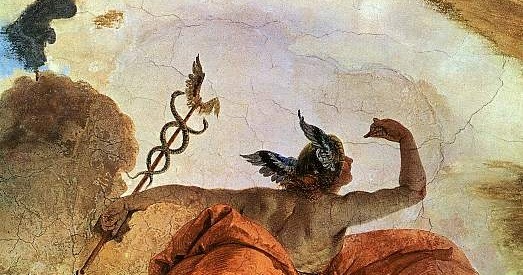
Herbs • Krokos (Crocus) koumara Tree, olives/olive oil, crocus, hydrangea, chrysanthemum, Palm tree, Almond tree, The Silver Birch tree, Crocuses, Saffron, Wheat, Rosemary, Pine Tree, Mint, Cinnamon, Cassia, Golden Benzoin, moly, strawberrys
Animals• sheep, dogs, boars, lions, Tortoise, Ram, The dove killing species of Hawk (hierax in Greek/Latin), Hare- (Greek “Lagos”), constellation Lepus, pig, ram, beef, mutton, pork, Cattle/oxen, hawks, roster, birds of omen, snakes, and guard dogs, fish.
Colors• Red, purple, silver, gold, copper, and black, Orange, Grey, Green, Red, white and brown (associated with traveling)
Crystal• Amethyst, Quartz, Orange topaz, Agate, Marble, smoky quartz, copper, silver, and gold, Eisenkiesel Quartz, Silver, Yellow Topaz, Amber, Citrine, Emerald, and Peridot, red marble, Hematite, jade, malachite, fluorite, pyrite, lapis lazuli, alexandrite
Symbol• Caduceus, Kerykeion (Herald’s staff and magic wand, lulls mortals to sleep and can wake mortals at will), Winged Cap (also called petasos, and a brimmed cap, this cap was called “Cap of Aidoneus, the unseen” because it rendered its wearer invisible), Golden Sickle, Winged Boots- called “pteroeis pedila”, A Sack (the kibisis) Talaria (winged sandals), and Petasos (winged helmet), golden or adamantine blade, shepherd pipes, Purse, Pouch, Hermai.
Mortal or immortal • immortal
Zodiac• Gemini and Virgo, and cancer
Equivalent - Mercury (Roman), Helios (Greek), Hyperion (Greek), Sol/Sol Invictus (Roman), Horus (Egyptian), Ra (Egyptian), Amun (Egyptian), Freyr (Norse), Bragi (Norse), Odin (Norse), Baldr (Norse), Heimdallr (Norse), Lugh (Celtic), Áine (Celtic), Mercurius (Roman god), Thoth (Egyptian god), Anubis (Egyptian god), Woden-Odin (Germanic god)
Attendees • Oreiades (oreads), Pan & the panes, Satyroi, oneiroi, he is often seen with Hestia.
Ephiphets• Agetor -Guide of Souls, Agonius or Enagonius -pertaining (Hermes’ role as presider over solemn festivals such as Agonius) Agoraea and Agoraeus- to Gods who were considered being the protectors of the assemblies of the people in the agora (also has a reference to the agora as the marketplace), Argeiphontes- “radiant one’, Euskopos Argeiphontes, literally “the sharp-eyed Slayer of Argos”, Chthonius or Chthonios, “of the earth or underworld, Hermes Trismegistus- “Thrice Great Hermes”, Kriophoros- the “ram-bearer” is a figure that commemorates the solemn sacrifice of a ram, Leucus- “white”- an epithet of Hermes in Boetia, a Greek city containing Thebes, “Of the Golden Blade”- he carried a sickle made of adamant, Cyllenius, or Kullhnios- from His birth or temple site on mount Cyllene in Arcadia, Diaktoros Argeiphontes – “the courier” Argeiphontes, Kratus Argeiphontes- “strong” Argeiphontes, Hermes Promakhos- “the Champion” Logios- writer, knower of intelligent design, Tetragonos- four square, Aglaos -Splendid, Agoraios - Of the Market Place, Aipytos -Of Aipytos, Akakesios -Of Akakesion, Angelos -Messenger, Agreiphontes -Argus-Slaying, Bouphonos -Slayer of Oxen, Dioktoros -Messenger, Dolios -Crafty One, Enagonios- Of the Games, Enodios - of the Road, Epimelios - Keeper of the flocks, Eriounios - Luck-Bringer, Euangelos - Bringer of Glad Tidings, Euskopos - Watchful, Gumnasiarkhos - Leader of the Gymnasium, Hermeneutes - Interpreter, Kerdoos - the Gainful, Kerukes -Herald, Kharmophron—Heart-Delighting, Khthonios - of the Earth, Khrysorrhapis -Of the Golden Wand, Klepsiphron - Deceiver, Kourotrophos - Protector of Youth, Kranaios- unknown, Krateros - Mighty, Kriophoros - Ram-Bearer, Kullenios - Of Mount Kyllene, Logios -of Speech, Maiados Huios - Son of Maia, Mekhaniotes - Trickster, Nomios - Protector of Flocks, Oiopolos - Shepherd, Pantokrator- Ruler of the World, Pheletes -Thief, Poikilometes - Full of Various Wiles, Poneomenos - Busy One, Promakhos- Champion, Propulaios - Before the Gates, Psukhopompos - Conveyer of Souls, Takhus - Swift, Tetragonos - Square, Trikephalos - Of the Three Ways/Heads, Trismegestos - Thrice-Greatest, Tukhon- Bringer of Luck, Aglaos- Radiant, Bright, Beautiful, Pleasin, enevolent. Angelos Athanatôn - messenger of the gods, Angelos Makarôn- messenger of the Blessed, Akhos Phêlêteôn- leader of robbers and thieves, Chrysorrhapis- of the Golden wand, Dais herairos - comrade of the forest, Diaktoros- guide & messenger, Dolios- Craft of Wiles, Dôtor Eaôn - giver of good things, Dôtor eaôn- Giver of good things, Enagônions- giver of good things, Enagônios-of the game, Epimêlios-Keeper of the flocks, Erikydês- famous, glorious & splendid, Eriounês - Luck bringing & ready helper, Euskopos-Keen-sighted, Hermêneutês- interpreter/translator, Kharidôtês- giver of joy/graces, Kharmonphrôn- Glad-Hearted, Krateros- Strong & mighty, Kriophoros- ram bearer, Kydimos-glorious, mastêrios- of searchers, mêkhaniôtês-trickster, Oiopolos- sheep tending& shepherd, Phêlêtês- their, robber, rustler, poikilomêtês- full of various wiles, Polytropos - Much traveled& much wandering, pompaios- the guide (he’s a psychopomp)
Element • air
Number•Four, eight, Squares (I’m not sure why…)
Past courtships• Merope, Aphrodite, Dryope, Peitho, and even Hecate, but some say, he is married to Peitho
Personality• People say he is chaotic, some say he’s wise and can be calm, he does give serious advice and is a serious guy, but he also has a sense of humor and won’t always steal from you. (he won’t if you ask him not to..I think.)
Patron of• of cunning thieves and liars, Patron of herdsmen, Patron of orators, Patron of inventors, Cattle-herders, Shepherds, Goatherds, Horse & mule breeders, Grazing pastures, Cave shelters, Guard-dogs, Animal predators, Bucolic poetry, music, Animal fables (ex- the tales of Aesop), Laws of hospitality, he is the Protector of guests, Cattle-rustlers, Bandits, Crafty thoughts, Mail carriers and sorters, Retail workers, Canvassers , Editors, journalists, and writers, Newspaper routes, Bank tellers, Carnies , Casino workers, Gas station attendants, Mechanics, presentations, public speaking, playlists (I've heard this years ago)
Diety of• Divine Trickster, boundaries and thresholds, Creator of civilization as Trickster, Messenger of the Gods, transgressor of boundaries and taboos, Inventor of fire, Inventor of sacrifice, of mysteries, Bringer of sleep, dreams, and visions, free will, Psychopompos or Guide of the Dead, Escort of the Gods, thieves, graves, and heralds, Luck, Unexpected Fortune, Giver of Good, of sacrificial priests, successful communication with enemies, translation and language, gymnasia and athletic youth, logos world order, trade and commodities, astronomy, knowledge, speech, Inventor of boxing, running and foot races, of exchange, alchemy, science, internet, Magic, Presider at solemn sacrifices, Divine Movement, Ruler of the Orphic House of Cancer, Ruler of the Planet Mercury, Western astrological signs of Gemini and Virgo, Scribe of the Gods, Protector of all messengers especially in war, Protector of wise women and elderly women, Fertility and Procreation, God of Masturbation, Soul Transformation and Guide through Consciousness changes, Heraldry and animal husbandry, speed, Codes, and Secrets, Caretaker of graves, Protector of travelers, Mechanics, Wine-pourer of the Gods, Inventor of weights and balances, Controller of Birds of Omen, hospitality, diplomacy, physical and moral boundaries, Orators, presentation, public speaking
Home• Mount Olympus
Fact• He invented the alphabet and dice and the lyre, he also has a stone called the “hermai” on the side of the road or a stone with a penis (he was a fertility god) to show a border or a crossing, sometimes to explain direction and distance, or in important landmarks is up ahead, the herms were worshiped, with offerings and anointed with olive oil and adorned with flowers and wreaths, telling us about the sacredness and importance of the hermai. (The ones near tombs are also connected to funeral rites)
Roots• Greek mythology, Mount Cyllene
Blessings • protection on the road, money randomly found, easy speaking, good parking, and less traffic. Herds multiply (fertility); Herds protected (from predators), Success in trade, Goods protected from thieves, having Persuasive speech, Poetic inspiration, Safe traveling, Protection of guests, Homes protected from thieves & criminals, having Wiliness and stealth,
Curses: Herds die off by disease and infertility, Herds lost to predators, Unsuccessful trade
Food recipe • Panspermia, a mixture of beans, peas, seeds, olive oil, milk, and honey, should only be offered to Hermes in his Underworld aspect. This offering is considered food for the dead and should not be tasted by the living (considered bad luck if Aten by living)
Offerings • Keys, Dice, Playing cards, Coins, Rocks/pebbles,Lucky charms (Cereal), Rabbit's foot, Horse shoe, Magic 8 ball, Coffee, Energy drinks, Herms, Road trip snacks (perhaps Hostess donuts), Airplanes/trains/cars imagery, Foreign/new foods, Trail mix, Peanut m&ms, rumane the marble popping soda drink, Turtles, Lyres/string instruments, Sandals/shoes/running shoes, Journals, Camping gear, Survival gear, like multitools, fire starters, first aid kits etc, Pens/pencils, Small (stolen) trinkets, Language dictionaries, Work out gear, Panpipes, Postcards, Letters, Mail, Stamps, Envelopes, Zodiac signs, Sheep/goats, Car parts, Backpacks/drawstring bags/bags, Crocos, Sticks, Saffron, Sticks, Books, Cups, Scales, Dream journals, Graveyard dirt, Cookie fortunes, Bikes/skateboards/skate, Old licenses/IDs, Sport trophies/jerseys/jackets/gear, Wings, Letters/numbers, Video games, Magic kits, Oranges/Lemons, Beer, White wine, Red wine for (His chthonic aspect, Milk, Mutton, Pork, Beef, Chamomile tea, Honey, Olive oil, Strawberries, Foreign foods, Eggs, Virgo or Gemini moon water,Golden objects, Silver objects, Musical instruments, Wands, Money/coins, Foreign money/coins, Dice, Pebbles, Feathers, Turtle shaped objects or art, Strawberry art or toys, Crocus flowers, Written stories or letters, Travel food, Souvenirs from your trips wheat, honey, twigs of olive, honey-comb and honey from local bees, cassia, cinnamon, saffron, include eggs, onions, garlic, pomegranate seeds, and fish or pork, barley grains, mead, beer (Especially German), lead, papyrus, pebbles, herms (or boundary stones), chocolate, whipped cream, coffee drinks, brightly-colored easter eggs, blueberries, granola, almonds, walnuts, pecans, Absinthe, beer, gin, vodka, red-bull, dry white wine, blessed moon water (especially in Virgo, Cancer, or Gemini), metal, jars, gin, pomegranates, onions, fish, garlic, Statues, Turtle Imagery, Hawk Imagery, Ram Imagery, Rooster Imagery, Marbles, Postcards, Chocolate, Lemons, Almonds, Mutton, Foreign Food, Brightly Colored Eggs, Onions, Sunflower Seeds, Fig Newton Cookies, Granola, Candies, Strawberry Milk, spring water, cookies or cakes, Wine, Golden cakes, Golden raisins, Apples, Music or poetry, Dancing, Drawings, pineapple, anything with computers, (especially boxing games, online games, and hackers), orange peels, gas station coffee!!, apples, bananas, grapes,Anything containing mercury, Crocuses, Panpipes, Saffron, Strawberries, Chocolate, Wheat, Honey, Lemons, Almonds, Cassia, Cinnamon, Pork or mutton, Spring water, Comforting a dying loved one, letters
Devotional• Board games, Dominos, pick up sticks, playing jacks, bouncy balls, peanut m&ms, write letters, go on walks, go run, do marathons in his honor, road trips, learn about alchemy, astrology, astral travel, prophet dreams, anything astrology related, learn basic car mechanics, give whatever to panhandlers, go talk to panhandlers (keep them company) , pranks, public speaking, tip well, stargazing, geocaching, learn a new language, Learn ASL, work out, Deive safely and predictably, use your blinkers fucking properly , bike/skate, clean your car, make a travel alter (for Hermes), get a passport, Travel , practice keyboarding, have a penpal, Train your voice, magic tricks, check your mail/email , low risk gambling (ex• lotto tickets) , make sigils, race, Play tag, be nice to wait staff, play sports, make maps of trails near you, make maps in general, play string instruments , Make herms, Carpool, Uphold confidentiality, Coin tricks, Be a reliable worker, Thrifting/yard saying, Dumpster diving, Making trades and barter, Help look for missing people/pets, Travel to new places, Learn a new sport, Practice speaking in public or online, Practice writing, Learn astrology, Learn astronomy, Learn about agriculture and animal husbandry, Learn magic tricks, Collect coins, Have a feast in His name, Dice games (ex- DnD), Card games, Donate to homeless shelters in His name, Give money to the hhomeless, Keep a dream journal, Write Him stories and poems or jokes, Honor the dead, Invoke Him on your travels or when looking for a job, always thank Him when you arrive safely or have some luck in your life, studying, learning, playing harmless pranks, attending magic shows, going on adventures, trying out new things, donating to fundraisers, working out, Taking a scenic route on your way home,Picking up loose change, Going to thrift stores, Being patient with delivery drivers, Going for walks, Making a mood board, Making a playlist, Making a dedicated journal, Giving to those in need, Going to/Watching sporting events, Practicing safe driving, Donations to hospitals and health institutions Donations to local artists, learn on how to save on gas, learn how to surf, draw sigils on shoes, leave coins when you leave places (extra points for pennys), give people in need a bus fare, clean off snow on other peoples car, clean your car, stopping for others (nicely, don’t run them over!), let him pick music, get a passport in his honor, decorate your passport, learn how animals communicate, call a love one, establish and force, dedicate a electronic to him, collect stamps and post cards, keep ur secrets, communicate with people when your upset,Keep a journal, Learn a new language/Revisit, Learn ASL, Learn about the evolution of language and how it is always changing, Be mindful of the language you use in daily life, Change your self-talk to positive, Voice training (Particularly for trans worshippers), Thinking before you speak, Learn about older forms of communication (ex- Morse Code), Learn braille,Go to the library and practice reading books in a foreign language ,Practice writing (great to do, Learn about the elements of writing, like allegory and metaphors, Play pranks (remember that good pranks cause confusion, not harm), Buy scratch offs/play the lottery, Understand how gambling addictions affect people, Dice and card games, Learn about good luck charms/Make your own, Learn about superstitions, Games like billiards or darts, Arcade/video games/carnival games, Make small/friendly bets, Poker nights in his honor, Do aGame of horseshoe, Learn parlor games, Smoke a bowl with Him, Learn a good joke, Write/perform stand up comedy, Checking your mail, Checking email/voicemail, Buying stamps, Flipping a coin, Dice divination, Charm casting, present a presentation in his honor, public speaking in his honor
Siblings• Aeacus, Angelos, Aphrodite, Apollo, Ares, Artemis, Athena, Dionysus, Eileithyia, Enyo, Eris, Ersa, Hebe, Helen of Troy, Hephaestus, Heracles, Minos, Pandia, Persephone, Perseus, Rhadamanthus, the Graces, the Horae, the Litae, the Muses, and the Moirai.
Appearance in astral or gen• Winged cap and boots, Traveller’s cloak, Youthful usually beardless figure or with a beard, with a Caduceus, sometimes seen with a mustache
Parentage• Zeus and the nymph Maia or Uranus and Hemera
Sacred days, festivals- Wednesday, the 4th day of the month, Hermaea, Agonius, in Cydonia social order was inverted for the festival and masters waited on their slaves, and slaves got to taste freedom.
Season• March, April, May, June (based on zodiacs)
Status• Messenger of the gods, and an underworld worker, he is called the darling of the gods
Music • anything from flutes or the lyre.
Sacred places• Mt Kyllene in Arkadia (his birthplace), Arcadia, mount Cyllene, Tricrena mountains, his Temples, his Cavern-shrines, Altars in market-places, gymnasiums, athletic arenas, house entrances.
Planet• mercury
Tarot• eight wands, magician, judgment, and maybe seven swords
Scents/Inscene • Frankensince, Myrrh incense, Lavender incense, strawberry, camphor, and malabathrumcock, storax, mastic, mace, moly, nettles, asafoetida, ginger, and marjolane, dragon’s blood incense, list cloves, tobacco, nag champa, poppy, and vanilla, ink on parchment, Musk, White Sandalwood, Nettles
His kids -Hermaphroditus, Tyche, Abderus, Autolycus, Eudorus, Angelia, and Myrtilus, Arabos, Abderos, Aithalides, Bounos, Daphinis, Ekhion, Eleusis (according to others, she was a minor goddess of Eleusinian Mysteries), Euandros, Kaikos, kephalos, keryx, kydon, libys, Mytilos, Norax, Orion, Paris, Paris, phaunos, polybos,saon
What I associate with him• rock music, bricks (he had two pet bricks that I had given him), dinosaurs, and wine (I promised to share my first cup of wine with him once I turn 21)
Prayers•
Safe travels
Swift-footed Hermes, friend of the traveler, friend of those who find themselves far from their homes, by will or by chance, I pray to you. Hermes, who moves between the realms with authority and ease, who leads men and women on their last, longest journey, who stands at the crossroad, who watches the byways, in you I place my trust, for by your might I know that when I stumble I will rise again, that when I choose my way I will choose aright. Hermes, as I make my way through the world, whether I wander or whether I walk my path with care, be with me.
In general
Hermes of the ready wit and the lightning smile, wing-footed one who carries the words of the gods, compassionate one who guides the newly-dead to the hall of Hades and fair Persephone, quick-thinking one who takes interest in the world and works of mankind, whose hand we see in a run of luck and a clever scheme, I call to you. Hermes, bearer of the herald’s staff, your gifts are great. You guard our homes with constancy and care, you grant to us a portion of your own craft and wile, you join with us when we revel and are merry, you stand with us when we are far from home, alone. You are ever with us, O Hermes; O god who holds in hand the good of men, I honor you.
hestia & hermes for good money
I call to Hermes, god of the marketplace,
god of the the deal, from whose hands fall shining coins. I call to Hestia, goddess of the home, goddess of good management, who knows the ways of thrift. Grant me a keen eye to spot a bargain, I pray; grant that I know false economy from true. Grant me the craft to repair what is broken, grant me the sufficiency to save for what may come. Grant me the wisdom to live with care, O gods, the discipline and skill to live within my means; grant me the wit to know my needs and my desires, grant me the judgment to know the difference.
sources - https://twelfthremedy.tumblr.com/post/621849449656942592/hermes-offerings/amp
Wikipedia. “Agetor.” Wikipedia, the Free Encyclopedia. Wikipedia, 10 Nov. 2010. Web. 12 May 2011. http://en.wikipedia.org/wiki/Agetor.
Burkert, Walter. “The Gods.” Greek Religion. Basil Blackwell and Harvard UP, 1985. 156-59. Print.
The original book was published in Germany as Griechische Religion der archaischen und klassischen Epoche. by Verlag W. Kohlhammer, Stuttgart, copyright year 1977
1b) Atsma, Aaron J. “ESTATE, ATTRIBUTES & ATTENDANTS OF HERMES : Greek Mythology.” THEOI GREEK MYTHOLOGY, Exploring Mythology & the Greek Gods in Classical Literature & Art. 2000. Web. 13 Apr. 2011. http://www.theoi.com/Olympios/HermesTreasures.html, Wikipedia. “Agonius.” Wikipedia, the Free Encyclopedia. Wikipedia, 10 Nov. 2010. Web. 12 May 2011. http://en.wikipedia.org/wiki/Agonius, Wikipedia. “Agoraea.” Wikipedia, the Free Encyclopedia. Wikipedia, 26 June 2010. Web. 12 May 2011. http://en.wikipedia.org/wiki/Agoraeus, Wikipedia. “Chthonius.” Wikipedia, the Free Encyclopedia. Wikipedia, the Free Encyclopedia, 20 June 2011. Web. 26 June 2011. http://en.wikipedia.org/wiki/Chthonius,Wikipedia. “Hermes Trismegistus.” Wikipedia, the Free Encyclopedia. Wikipedia, the Free Encyclopedia, 9 June 2011. Web. 26 June 2011. http://en.wikipedia.org/wiki/Hermes_Trismegistus., “Kriophoros.” Wikipedia, the Free Encyclopedia. Wikipedia, the Free Encyclopedia, 11 June 2011. Web. 26 June 2011. http://en.wikipedia.org/wiki/Kriophoros, Wikipedia. “Leucus.” Wikipedia, the Free Encyclopedia. Wikipedia, the Free Encyclopedia, 13 Feb. 2011. Web. 26 June 2011. http://en.wikipedia.org/wiki/Leucus, Atsma, Aaron J. “ESTATE, ATTRIBUTES & ATTENDANTS OF HERMES : Greek Mythology.” THEOI GREEK MYTHOLOGY, Exploring Mythology & the Greek Gods in Classical Literature & Art. 2000. Web. 13 Apr. 2011. http://www.theoi.com/Olympios/HermesTreasures.html, “CYLLENIUS, Greek Mythology Index.” MYTH INDEX, Greek Mythology. Myth Index, 2007. Web. 13 Apr. 2011. http://www.mythindex.com/greek-mythology/C/Cyllenius.html, Sannion. “Wildivine.org – Offeringsto Hermes.” Wildivine.org – Dionysos, Hermes, Nymphs and Pacific Northwest Polytheism. Wildvine.org. Web. 26 June 2011. http://www.wildivine.org/hermes_offerings.htm.1, Sannion. “Wildivine.org – Offerings to Hermes.” Wildivine.org – Dionysos, Hermes, Nymphs and Pacific Northwest Polytheism. Wildvine.org. Web. 12 May, http://www.wildivine.org/hermes_offerings.htm, Sannion. “Wildivine.org – Hermes’epithets.” Wildivine.org – Dionysos, Hermes, Nymphs and Pacific Northwest Polytheism. Wildvine.org. Web. 12 May 2011. http://www.wildivine.org/hermes_epithets.htm.
https://greekpagan.com/category/prayers-2/hermes/
https://journal.uny.ac.id/index.php/diksi/article/download/49223/18693#:~:text=The%20red%20or%20green%20color,one%20of%20the%20Olympic%20gods.
travelingthief.tumblr.comhttps://www.tumblr.com/themodernwitchsguide
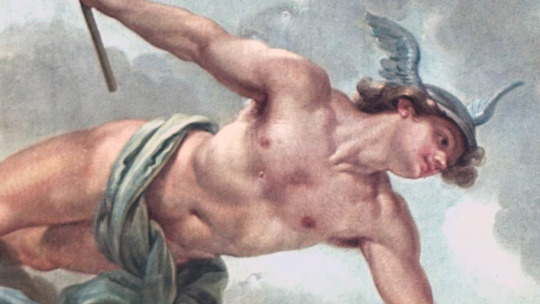
Hermes is the darling of the gods, and very important in everyday life, whether we know it or not, handsome in charm and looks, he is also knowledgeable about many things.
#the gods#hellenic devotion#hellenic polytheism#doing the research for you#hellenic worship#greek gods#greek mythology#hermes#greek tumblr#greek posts#ancient greek#/hermes#percy jackon and the olympians#percy jackson#deity work#polytheist#deity worship#paganism#paganblr#hellenic pagan#hellenic paganism#hellenic polythiest#Don’t ingore me#Care#H#E#R#M#ES#hermes deity
88 notes
·
View notes
Text
REASONS ODYSSEUS SHOULD ADOPT ME:
I have wavy hair (like in the sea?) (Ugh I'm not funny)
I don't have blue eyes
I LOVE Athena
I also love Telemachus, but we're very different, so I'm sure we can fight like siblings
I can weave
I can sword fight
My biggest dream is Odysseus to be my mentor (or Athena!)
I'm vegetarian, so ill never eat Helios's sacred cattle
im good at math!
Ody's probably taller than me
#mithology#greek mythology#greek myth#the odyssey#odysseus#odyssey#homer#homers odyssey#homers iliad#telemachus#penelope#epic: the musical#epic#epic the musical
38 notes
·
View notes
Text
Counsel to the Young Prince of Ithaka
“You see, Odysseus,” my grandfather shifted his weight on the unsteady branches of an old olive tree. We were far outside of the palace, away from the view of the royal guard and my father. He loved these places, trails that wouldn’t necessarily lead you anywhere in particular, and there were many in Ithaka, though it was a small island. He plucked a small bunch of olives from the branches, cupping them neatly in his hand as he came back down towards me. He passed me one — purple, soft and overripe. I grimaced as it fell on my hands, mother always said they were bad for you. “You wouldn’t eat one of those would you? They’re much too old now”, he dropped the rest of the purple olives on the grass.
“Oh don’t make that face!”, he said as he reached into his old leather bag, “Here! You’ll prefer this”. His arm outstretched toward me, holding an apple, an ugly, rotten thing. It seemed to crumble every time he swung his arms around to speak — which he always did. “Appearances are very important, young man, aren’t they?”, he said confidently, Grandpa Autolycus always knew what he spoke of, he had lived a life full of experience. “You wouldn’t eat this, would you?” he held it nearer to me. “No! Eww”, I grimaced, it smelled even worse than it looked. “But what if I…” he held my attention as he passed the rotten apple behind his back, from his right hand to his left, and out came a shining, almost golden, apple. They said it was his gift, as the son of lord Hermes.
“How did you do that!” I was shocked, my eyes filled with wonder at the gleaming fruit in front of me. It seemed to glow as the sun struck it through the leaves of the olive trees that surrounded us. It almost looked godly, like something Lady Athena or the mighty Lord Zeus would dine on. I inched ever closer towards it, its beauty mesmerizing me. The smell of rot and disgust hit my nose the moment the apple was up to my young face, and I darted back as the horrible stench approached me. “Appearances can be deceiving, wouldn’t you say?” he laughed as I attempted to get rid of the smell that had now plagued my nose and would disappointingly remain with me for the remainder of the day.
“But one can change their appearance” I saw the apple transform with a snap of his fingers, crumbling back into the rotten mess it was before “Even the mightiest of men can look poor and wretched if given enough practice. Even you, Odysseus!” He said as he ruffled my hair, laughing as the strands began to cover my gray eyes. In between laughs I stammered, “Stop!”. He managed to pick out some better olives, green ones, which we ate as we watched birds fly over Ithaka. I laid by him as Helios traveled below the Earth and night came. Nights were quiet in the island, only the sound of the crashing waves and the leaves of olive trees being rustled by the wind could be heard, perhaps the sound of a boar if you were unlucky.
“I taught Herakles how to wrestle, you know?” he laughed as he lifted me above his shoulders, “You’re lying!” I shouted with doubt as I laughed along. He stopped for a second, an almost imperceptible second, “I lie to everyone else, young man”, his face turned serious, “but not you. You’re too clever for that”. It was the first time he’d spoken to me without the hint of a chuckle in his voice. “Do not forget this, Odysseus. You are more clever than you know”. I did not understand him then –most of his words fell on attentive, but deaf ears— he spoke to me as though I were an older man, after all. A man such as he, bearded and full of experience. But I was not an old man like him, I was young, spry, and endlessly energetic. Though his words stuck with me even more than the scar that marks my thigh, and I would understand his counsel.
As we reached the castle, and he ignited my imagination with tales of monsters and gods — how lord Hermes stole the cattle of great Apollo, or how Perseus slayed the terrifying Medusa — until I fell unconscious on his lap and Eurycleia lifted me to my bedchambers.
“He loves you more than anything else in Ithaka,” she said as she tucked me into bed, “You were named by him you know, not your father”. I had heard the story before, my father and Eurycleia had brought the young boy, the heir to the throne of Ithaka, to the lap of his grandfather. He looked at the boy with joy, his young, gray eyes reminding him of adventures of his past. Eurycleia recommended the name Polyaretos, “most wished”, she said with tears in her eyes, “we have prayed much for this young boy”. My father seemed pleased, though my grandfather disagreed. “Odysseus” he told him, “hated one, that shall be his name”. He did not laugh, Eurycleia maintains that she could see tears welling up in his eyes. My father was opposed to marking the next heir to the throne with such a bad omen, yet my grandfather persisted. “Give me this, young man” he said to King Laertes, “this boy will be far more than all of Ithaka, I will assure it”. He stood, holding the baby softly to his chest and walking towards the young king, “name him Odysseus”.
No one is quite sure why I was called Odysseus, some don’t even believe it is of our native tongue. But it was important for my grandfather, regardless of what it meant for my future. I was important to him, perhaps he saw me as a second chance for the actions he regretted. “He was a haunted man” some would say, but they did not know the beaming, grinning Autolycus I knew. The old man who would run through the rocky hills of Ithaka with an infant on his shoulders who could not contain his excitement, or would involve his grandson in his many mischievous plans, to the delight of the young boy. He was a man who would do anything for his family.
I am older now, 22 years of age, expecting a young boy, Telemachos. I will do all I can to see him grow, to advise him and show him the beauty of our kingdom. I will be there for his first steps, for his first words, for the first time his beard begins to grow. He will be my pride, my joy, my world. I understand now, perhaps, why that young, gray-eyed boy meant so much to the old man.
-Odysseus, father of Telemachos
#the odyssey#the iliad#iliad#odyssey#odysseus#telemachus#telemachos#autolycus#laertes#writing#is this fanfic?#fanfic#fanfiction#greek tumblr#greek mythology#epic the musical#homeric epics#tagamemnon#trojan war#mythology#creative writing#ithaca#ithaka#Eurycleia
47 notes
·
View notes
Text
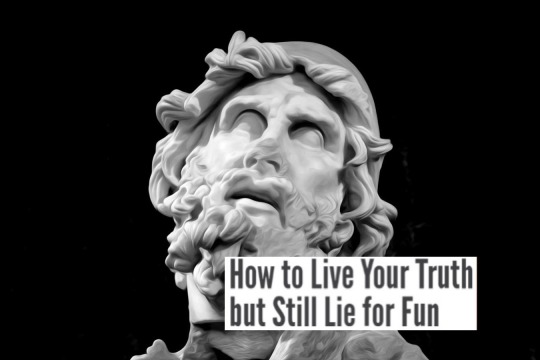
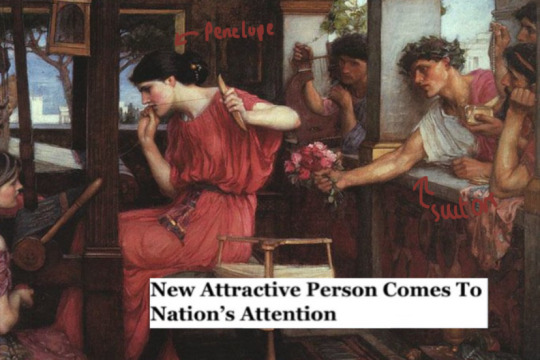
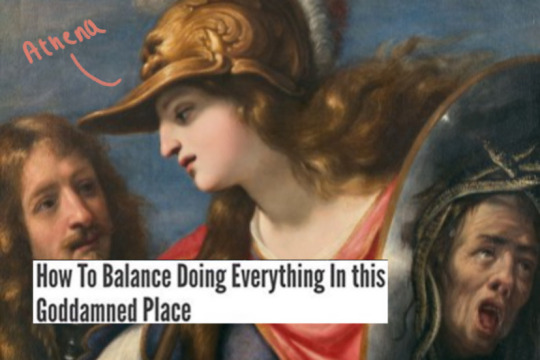


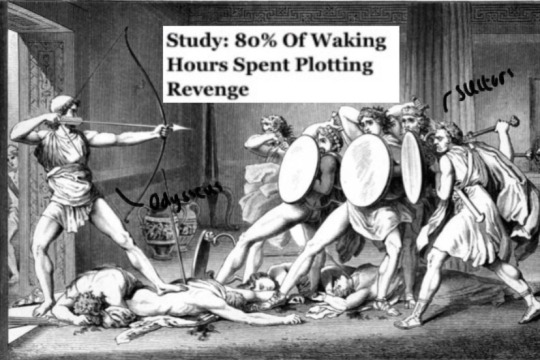


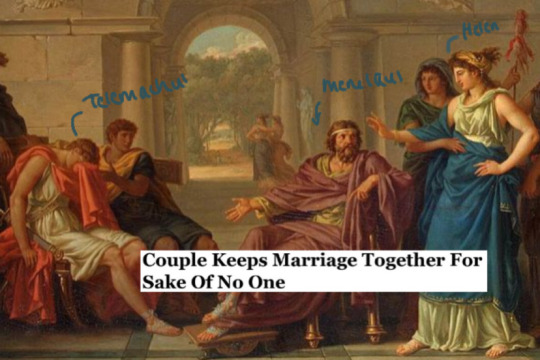

The Odyssey as headlines!
art: (1)Head of Odysseus from a Roman period Hellenistic marble group representing Odysseus blinding Polyphemus (2) Penelope with the suitors by John William Waterhouse (1911/12) (3)Portrait of Don Lorenzo de Medici and Athena Cosimo Ulivelli (17th century) (4) Circe offering a cup to Odysseus by John William Waterhouse (1891) (5)Neptune and Amymone, 1757, Carle Vanloo (6)Odysseus returning home by John Flaxman (16th/17th century) (7)The return if Telemachus to Penelope by Antonio Zucchi (1726) (8) Illustrattions for Homer's Odyssey by Jan Styka a Polish painter (1901-1903) (9)Helen recognising Telemachus, son of Odysseus by Jean-Jaques Lagrenée (1795) (10)The Companions of Odysseus Steal the Cattle of Helios (fresco by Pellegrino Tibaldi, 1554/56)
#the odyssey#odysseus#funny#greek mythology#mythology#incorrect quotes#incorrect greek mythology#incorrect odysseus#athena#poseiden#literature#classics#classical studies#art#art history#history#penelope odyssey#circe#madeline miller#circe book#homer#the iliad
248 notes
·
View notes
Text
*at a birthday shower* hey just to let you know I have the gift of prophecy and the gods say your baby is going to come out ripped. totally shredded. strongest baby since hercules. you might want to go ahead and schedule cesarean section. yeah, I’m sorry. kind of bummer news for you. great news for the baby though. he’s going to have a super eventful cool life until he punched one of the cattle of helios to death and the god punishes him. but he’ll be 42 so you’ll be dead by then so don’t worry about it. why are you crying? I just told you your kid is going to be a hero and you’re crying
257 notes
·
View notes
Text
No, Eurylochus! Odysseus SPECIFICALLY said not to touch Helios’ cattle.
🙄
16 notes
·
View notes
Text
Events in the Odyssey, ranked by how often they show up in retellings and adaptations
I have read, watched, and listened to many an Odyssey retelling in my day (my day = the last month or so) and I have noticed some Patterns.
Iconic Odyssey Momence™
These are the defining episodes of the Odyssey. Every adaptation of the Odyssey HAS to have:
The lotus-eaters
The Cyclops
Poseidon is Angery
The sirens
Scylla and Charybdis
Mix-n-Match
If there is a little bit more time, a little bit more dedication to faithfulness, or a little bit more mature target audience, these are the important events that fill out the narrative:
Circe
Calypso
the bag of winds
Penelope weaves the shroud
the journey to the underworld
Odysseus returns home and murders the suitors
the Trojan Horse, if the reteller remembers that that story was actually relayed in the Odyssey
Deep Cuts
Really only the completionists include these:
Athena hangs out with Telemachus
Nausicaä
the men eat the sacred cattle of Helios (this is such an important moment in the poem and comes up in adaptations weirdly rarely)
Telemachus dicks around in Sparta
Literally nobody ever includes these
I had no idea these were a thing until I started reading the Odyssey:
raiding the Ciconeans on Ismarus
the Laestrygonians
Telemachus dicks around in Pylos
#It’s actually super funny how Jay Rivera-Herrans WAS actually going to try to put the raid on the Ciconians in Epic: the Musical#Had a whole draft song called ‘Ismarus’ and everything#And then evidently realized that ‘Ismarus’ / ‘Let Me Be Your Light’ was both grinding the momentum of the plot to a halt#And crowding out space to include the lotus-eaters#And like. When you are retelling the Odyssey and your choices are between including the Ciconians and including the Lotus Eaters#You choose the Lotus Eaters#So ‘Ismarus’ / ‘Let Me Be Your Light’ became ‘Full Speed Ahead’ / ‘Open Arms’#and once again no one cares about the poor Ciconians. lmao#The Odyssey#tagamemnon#Epic the Musical
175 notes
·
View notes
Text
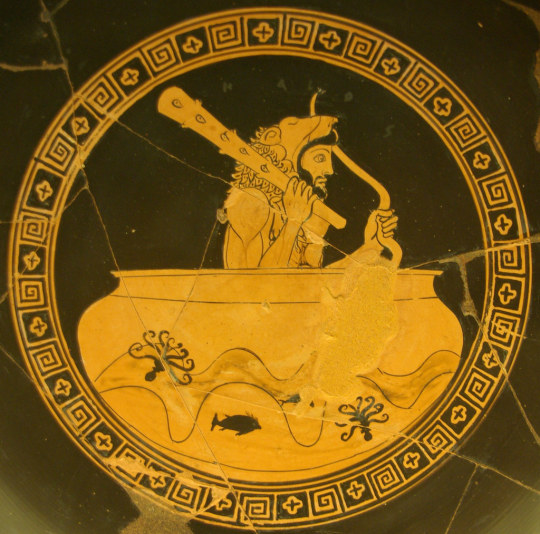
And then Hyperion's strong child went down into the cup of solid gold, so that he might cross over Okeanos and reach the depths of holy, dark night and his mother and wedded wife and dear children; while he Zeus' son, who has reached Erytheia in the cup or has traveled back to the mainland in it, now returns it to Helios went on foot into the grove, shady with its laurels.
- Stesichorus, Geryoneis Fragment
When Helios made him hot as he proceeded, he aimed his bow at the god and stretched it; Helios was so surprised at his daring that he gave him a golden goblet, in which he crossed Okeanos. . . He then loaded the cattle into the goblet, sailed back to Tartessos, and returned the goblet to Helios.
- Pseudo-Apollodorus, Bibliotheca
This amusing image, as described in the quotes above, depicts Heracles cozy within Helios' golden goblet, the vessel that the sun god uses to cross Oceanos, the waters that surround the world, and reach the east during the night (apparently another tradition has him voyage to the east while sleeping in a golden bed).
Heracles' borrowing of the golden goblet happened on his tenth labor during his journey to the far west to steal the cattle of the ominous three bodied giant Geryones, during which he also erected the famed pillars that are named after him.
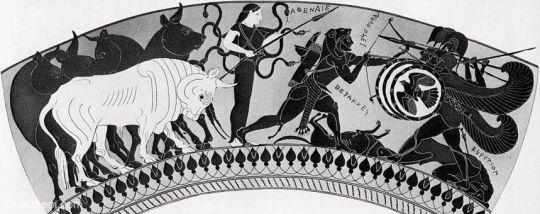
Heracles' labor aside, this golden goblet/bed made me wonder if Helios might have had different nightly vehicles in other traditions, and the one thing that sprung to mind first is the dragon chariot which Helios had gifted to his granddaughter Medea:
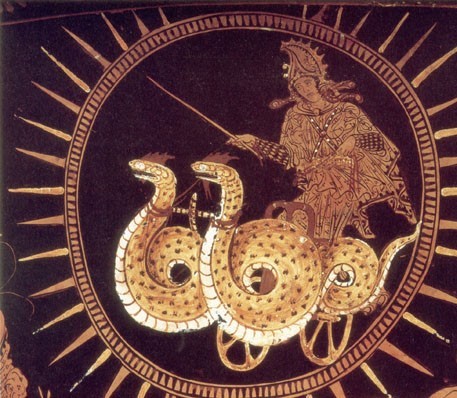
The dragon and the serpent being commonly associated with Chthonic deities, it made me wonder whether some ancient Hellenes might have had a tradition where Helios, rather than circumnavigating the world through Oceanos, he instead traveled astride the dragon chariot through Hades much like Ra does to reach the east.
As interesting as this theory is though, it is far more likely, as @wendelsae pointed out to me, that the dragons which pull the chariot are instead related to the dragon in the far east which guarded the golden fleece and the dragon Ladon to the far west which guarded the golden apples, their connection to Helios being the location of far east and west rather than anything else.
And if so, even if they have no chthonic connotations, it is not unlikely for the dragons to be related to Helios' nightly aspect.
10 notes
·
View notes
Text
Waiting for Love (part 3)
Part 3: Alone
Odysseus was alone. Out of six hundred men — six hundred — he was the lone survivor, floating away to who knows where on his makeshift raft. For ten whole days, he kept coughing up salt water, choking on his tears, and being reminded of his mutinous crew.
Every time he thought of them, he couldn’t help but feel guilty. Guilty for not being able to save them. Guilty for cutting their journey short. Guilty for making their families at home wait for someone who won’t ever come back.
He could only hope that his family wouldn’t experience the same thing.
But underneath all that guilt, he felt … different. He hated to admit it, but he had changed. He thought, deep inside, that his crew deserved their fate. That they deserved to die. Especially Eurylochus.
Odysseus hadn’t wanted to fight him — he had thought of him as a brother. And how had he repaid him? By doing the one thing he had told him not to do — eat Helios’s cattle. It was his own fault he was dead.
Or was it?
What if it Eurylochus and the rest of the crew wasn’t to blame? What if the person to blame … was Odysseus? What if he had become who Poseidon had wanted him to? What if he had become ruthless?
What if he had become a monster?
So Odysseus pondered, drifting along on his raft, watching an island in the distance slowly draw nearer. He hoped he’d find some food there, or shelter, or even just a little company.
Hope — that was all he could do now.
•••
The second Odysseus washed up on shore, his makeshift raft splintered apart, the pieces drifting back into the wine dark sea.
There goes my only way home, he thought to himself, his heart sinking.
He wandered along the shoreline for a while, trying to find some sign of civilization. Eventually, he came across a small hut where a fire burned inside.
“Hello?” he prompted.
No response.
He took another step forward, cautious. Still no response. So he looked around, thinking he’d find something useful.
And he noticed a scroll of papyrus sitting on a desk.
His mind was suddenly flooded with thoughts of his family, of his kingdom. How he longed to go back to them, to see them once again. It’d be a while before he got to do that.
But in the meantime, he could write to them. He knew they’d probably never see his letters, but it was the only way he could feel somewhat connected to them while he was away. Hopefully, he wouldn’t be away for much longer.
He started to write.
Dearest love of mine,
I know I promised I’d be home soon. I know I broke that promise. But I am still trying. Still fighting.
If it wasn’t for my mutinous crew, I’d be in your arms right now. They opened the bag. Then they slaughtered the sun god’s sacred cattle. We were thrown off course, and my entire crew was struck down by the son of Cronus’s lightning. Only I was spared — I and Eurylochus. Eurylochus, whom I treated as close as a brother — I was betrayed by him.
Do something for me, Penelope. Tell Ctimene I’m sorry. Tell her that as much as I didn’t want to fight her husband, I was left without a choice. It was either me or him. Tell her I’m so very sorry.
As for yourself, my love — wait a little longer. My journey is not over yet, but I will get back to you. I promise. I will get back — even if it means I have to fight the entire world.
Wait for me, Penelope.
He finished his letter, his lips forming a slight smile as he brushed his thumb over his beloved’s name.
A clatter snapped Odysseus out of his thoughts. He whipped his head around to see a woman — a gorgeous one at that — standing behind him, a look of surprise on her godlike face.
Surprise that quickly transformed into a smile.
Odysseus’s hands began to tremble. His gut twisted. He knew that smile — he’d seen it on Circe’s face before.
And he didn’t like it.
Previous (2) || Current (3) || Next (4)
#waiting for love#the odyssey#epic the musical#odypen#odysseus x penelope#odysseus#odyssey#epic: the musical#odypen supremacy#penelope#jorge herrans#jorge rivera herrans#jay herrans
16 notes
·
View notes
Text
charybdis, sea monster of the deep (asteroid 388)

No one knows the origins of this creature of the sea - yet some claim she must be the daughter of Poseidon and Gaea. Charybdis frequently appears in stories where heroes are at seas. After Hercules's tenth labor she tried to steal his cattle, Jason sailed between her and Scylla, etc. Odysseus was told by Circe that he was better off sailing close to Scylla and losing a few men over sailing too close to Charybdis and losing both the ship and his crew. Unfortunately, when Odysseus's men offend Helios by eating his cattle, he forced the crew - on the sail back from whence they came - to sail over Charybdis and the ship was suck down in a whirlpool. Only Odysseus made it out alive. IN MY OPINION Charybdis in your chart can represent a) what is all consuming in your life, b) why people fear you, and/or c) your eating habits.

i encourage you to look into the aspects of charybdis along with the sign, degree, and house placement. for the more advanced astrologers, take a look at the persona chart of charybdis AND/OR add the other characters involved to see how they support or impede charybdis!
OTHER RELATED ASTEROIDS: gaea (1184), poseidon (4341 / h47), jason (6063), heracles (5143), circe (34), odysseus (1143), ulysses (5254), and scylla (155)!
like what you read? leave a tip and state what post it is for! please use my "suggest a post topic" button if you want to see a specific post or mythical asteroid next!
click here for the masterlist
click here for more greek myths & legends
want a personal reading? click here to check out my reading options and prices!
#astrology#astro community#astro placements#astro chart#asteroid astrology#asteroid#natal chart#persona chart#greek mythology#astrology tumblr#astroblr#astrology notes#astrotips#astro notes#astro content#astro observations#astrology readings#charybdis#asteroid388#gaea#asteroid1184#poseidon#asteroid4341#jason#asteroid6063#heracles#hercules#asteroid5143#circe#asteroid34
33 notes
·
View notes